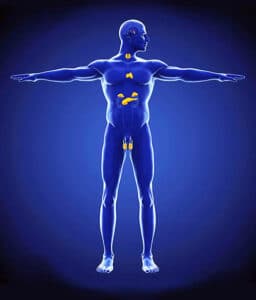What are carbohydrates and why shouldn't you give up carbs if you want to lose weight?
You have probably heard more than once that carbohydrates are the main culprits in our overweight, and if they are excluded from the diet, weight is lost quickly and permanently.
There are even a number of very low-carb diets, such as Keto, Atkins, Dukan, Paleo … And there are people who have really lost weight thanks to these diets.
However, there are many nutritionists who believe that these diets do more harm and that the theoretically possible weight loss does not outweigh the health risks.
So are carbs good or bad? What scientific research says about carbohydrates and what you should know about carbohydrates if you want to lose weight.
But let's start with a bit of theory.
What Are Carbohydrates?
Carbohydrates are one of the three main nutrients (protein, fat and carbohydrates) from which our body obtains energy or calories.
Carbohydrates are mainly a source of energy, good mood and well-being. We need carbohydrates, and it's very stupid to categorically refuse them. Some of our organs, such as the brain and red blood cells, can only absorb energy with glucose, and if there are no carbohydrates in the diet, they can be damaged.
The belief that carbohydrates are harmful began to form with an increase in the proportion of industrially processed foods in our diet. Ultra-processed foods contain many calories but have almost no vitamins, minerals, or antioxidants.
But,
Carbohydrates are different
Carbohydrates are divided into simple or "fast" and complex or "slow" depending on the number of their components.
Simple carbohydrates are easily digested and quickly increase blood sugar levels. Regular consumption of foods containing "fast" carbohydrates is likely to lead to weight gain, because:
- Ultra-processed food products are high in calories (100 g of biscuits contain many more calories than 100 g of any vegetables);
- We can eat a lot more processed food than the same vegetables. Accordingly, we are gaining much more calories;
- With ultra-processed foods, we often unconsciously consume too many calories. For example - with sweetened drinks and packet juices;
- Many ultra-processed foods are so delicious that we can't stop eating them and eat while the packaging is empty…
This created the idea that carbohydrates are harmful.
What do I want to say?
Yes, if you want to lose weight you really should give up products like sweetened carbonated drinks, packet juices, premium wheat flour products, sugar…
That is, ultra-processed foods really should be abandoned.
But we really need carbohydrates…
Yes, and there are complex carbohydrates that are processed much more slowly and provide us with energy for a long time - whole grain products, wholemeal bread, vegetables, mushrooms, pulses…
All of these products provide us not only with calories/energy but also with vitamins, minerals, and enzymes - without which our body cannot function properly.
Including fat burning.
Read more about the best sources of carbohydrates HERE.
Why should carbohydrates not be excluded from the diet?
You've probably heard of the concept of a balanced diet.
The story is about that - about the compound or "slow" carbohydrates in our diet.
If there are no carbohydrates, or if they are not enough,
You may become deficient in nutrients
Many foods containing carbohydrates are also rich in fiber, minerals, vitamins, and antioxidants…
These substances are necessary for our body to function properly - for our immune system to be able to resist diseases caused by viruses and other factors, for us not to have problems with the digestive system, for our bones, muscles, cartilage, skin, hair, nails - to be healthy and beautiful.
If you exclude carbohydrates from your diet, your body may be deficient in one or more nutrients.
To prevent this and maintain health, vitality and beauty, the missing nutrients must be taken in with other foods.
But to do this, you need to know which nutrients you are missing in your diet and which foods can compensate for them.
Your fiber intake may be too low
Fiber is not one of the main nutrients (protein, fat, carbohydrates), but we need it very much.
Fiber is essential for both digestive and heart health.
This is also confirmed by studies - people who eat more fiber have more beneficial bacteria in the intestinal microflora and are less likely to develop cardiovascular disease.
Fiber also helps us feel full longer, which is very helpful if you want to lose weight.
The best sources of fiber are whole grains, vegetables, fruits, legumes, nuts and seeds.
But we eat them on average 2-4 times less than recommended. As a result, various gastrointestinal problems are not uncommon.
By giving up composite carbohydrates, you will further reduce your fiber intake - you will create additional risks to your health.
Your brain needs carbs
The brain's preferred source of energy is carbohydrates.
Scientists have estimated that the brain consumes about 100-150 grams of glucose every day and that our brain consumes about 20% of all our daily energy (calories).
Anyone who has tried a low-carb diet is familiar with at least one of the following symptoms:
- Dizziness;
- Mental fatigue;
- Mood swings.
These are the symptoms that occur when the main source of fuel for the brain suddenly disappears. Of course, your body adapts, and over time these symptoms should disappear. However, the reason - not enough carbohydrates, remains. This is also one of the reasons why it is so difficult to follow low-carb diets.
But remember - carbohydrates are different. Sugar (fast carbohydrates) in sweets, chocolate, etc. is not the best choice. If you feel that it is difficult for you to concentrate, it is better to eat some fruit (fruit, not juice, because with fruit you will also absorb fiber).
Carbohydrates will help maintain muscle mass during weight loss
When you lose weight, you also usually lose some muscle mass, because when you lose weight, you should absorb less energy (calories) than your body needs. And it's easier for your body to get the missing energy from protein (muscle) than from fat.
This process is described in more detail HERE.
Maintaining muscle mass while losing weight is very important, as decreasing muscle mass (muscles are the biggest consumers of energy) slows down our metabolism - less and less energy is needed to survive.
And the slower the metabolism, the harder it is to get rid of extra pounds.
A sufficient amount of protein is always mentioned as a basic prerequisite for muscle formation. It's true.
However, carbohydrates also play an important role in muscle formation.
Because - muscles are formed when they work, but if you lack energy - you will get tired quickly, and the muscles will not receive the load they need - to keep fit or grow.
In addition, carbohydrates can also help your muscles recover faster after a hard workout.
Read more about pre- and post-workout nutrition HERE.
The exclusion of whole food groups can lead to eating disorders
The complete exclusion of any food group can cause health problems and various eating disorders.
Orthorexia nervosa - is probably the most frequently mentioned problem in studies.
This is similar to an obsession with healthy eating, which has a negative impact on both the health of these people, as well as on their daily activities and social life.
Short-term health effects of low carb diets
Initially, low-carbohydrate diets can promote rapid weight loss by rapidly reducing the amount of energy (calories) ingested by food.
And
To get the carbohydrates that he does not get with food, the body begins to use glucose and glycogen reserves from the liver and muscles. To release 1 gif glycogen, about 3 g of water is needed. Accordingly, water is excreted from the body, and fat is not "burned".
When existing carbohydrate stores are depleted, the body begins to obtain energy from other sources, including fat. This can cause to formation of ketones (oxybutyric acid, acetic acid, and acetone) in the body. These are very important metabolic changes that can be dangerous and, in rare cases, even fatal for some people.
There is also a real opportunity to get acquainted with metabolic acidosis (changes in blood pH to the acidic side).
Symptoms that may occur with a low carb diet include:
- Nausea;
- Dizziness;
- Constipation;
- Chronic fatigue;
- Dehydration;
- Bad breath (one of the ketones is acetone);
- Loss of appetite.
Long - term health effects of low carb diets
The long-term health effects of very low-carb and high-fat diets have not yet been fully explored.
However, research is underway and it can now be said with some certainty that the following long-term consequences are possible:
- Weight gain - when you resume a normal diet, the amount of artificially drained water is restored and the weight returns quickly;
- Intestinal problems - Limited intake of antioxidants and fiber from fruits and vegetables can increase, for example, the risk of constipation;
- Weight loss is becoming increasingly difficult, for example, due to the yo-yo effect (when people lose and regain weight many times in a long period, rather than gradually and continuously losing weight until they reach the desired level and then being able to hold it);
- High cholesterol, obesity, and obesity-related disorders. A diet high in protein and fat increases the risk of diseases such as cardiovascular diseases, diabetes and cancer.
- Kidney problems - may occur in people with impaired kidney function or diabetes;
- Osteoporosis and related conditions due to loss of calcium from the bones.
How to lose weight healthily
Healthy nutrition is a balanced diet. A diet that is high in fruits and vegetables, whole grains, legumes and dairy products. And also the vitamins, minerals, enzymes, and antioxidants we need.
Calculate the amount of energy (calories) you need and try not to exceed it.
You can calculate the amount of calories you need HERE.
If you want to lose weight - reduce the amount of energy you take in with food by 10-15%.
Avoid large portions and foods high in saturated fat and sugar — this will help control the amount of energy absorbed by food.
Regular physical activity will help you both to lose weight and improve your well-being.
If you do not know where to start, contact a professional who can help you prepare a menu that suits your health and lifestyle.
Cook yourself using fresh and unprocessed or lightly processed foods.
For inspiration, healthy, low-calorie recipes are here.
Key takeaways
Obesity is not only an aesthetic but also a medical problem.
To adjust your weight, you need to start by adjusting your diet.
Because being overweight comes directly from an unbalanced diet, a diet high in saturated fat and too many "empty" calories (simple or "fast" carbohydrates).
By eliminating all carbohydrates from your diet, including compound or 'slow' carbohydrates, you will intake too little fiber, thiamine, folate, vitamins A, E and B6, important antioxidants, calcium, magnesium, iron, and potassium… Your body does not receive the nutrients it needs and health problems begin.
So don't be afraid of carbohydrates, but remember that they are not all the same.
Eat delicious, exercise and be healthy.
Sources:
Sugar for the brain: the role of glucose in physiological and pathological brain function
Low-carbohydrate weight-loss diets. Effects on cognition and fashion
Fundamentals of glycogen metabolism for coaches and athletes
Role of nutrition in performance enhancement and postexercise recovery
Regulation of Muscle Glycogen Repletion, Muscle Protein Synthesis and Repair Following Exercise
Orthorexia Nervosa: An Obsession With Healthy Eating
Controversies Surrounding High-Protein Diet Intake: Satiating Effect and Kidney and Bone Health
Low-carbohydrate diets: nutritional and physiological aspects
Effects Of Low-Carbohydrate vs. Low-Fat Diets On Weight Loss And Cardiovascular Risk Factors
Share this article
Follow me on Facebook
I recommend reading these articles as well

Hormones - what are they, and what do they do?
Kā hormoni ietekmē mūsu organismu – mūsu veselību un izskatu? Kas ir hormonu disbalanss, kādas ir tā pazīmes un kā ar to cīnīties?

Physical activity for a healthy weight
Why is regular physical activity important? How does it affect my weight and well-being? How much physical activity do I need?

Why can't I lose weight?
How to lose weight and the top 12 reasons you lose less weight than expected.

Healthy and unhealthy food
How does ultra-processed food affect our health? Or, why is it better to cook by yourself and eat with family and friends?

